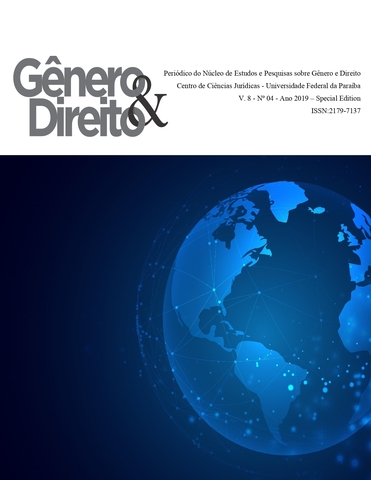ETHNO-PSYCHOLOGICAL ARCHETYPES: UNCHANGEABLE CODES OF THE HISTORY
DOI:
https://doi.org/10.22478/ufpb.2179-7137.2019v8n4.48384Palavras-chave:
amyth, archetypes, a plot, folklore, mythical thinking, Khizir, a human, time, a memory, a tradition, history.Resumo
The internal mechanism of mythical subjects’ self-organization resuscitates the folklore and gives life to it at any time. The folklore becomes active only in a person’s life. Particular people renew forms existing for centuries on the improvisation basis. Thus one can get rid of monotony and a tradition gets a new breath in the performance of each person as well. The tradition is kept, but expressed by a new rhythm and breath. And it shows that myths always live and go through centuries in a new improvisation. Elements of mythical thinking, as archaeological types, always become the center of the researchers’ attention. But there are still such problems in this area, so that are of scientific interest. There are issues among them that have a direct appeal to the philosophical thinking. The observation of striking similarities among myths of the world people is of this kind. These are plot similarities. Even the mythical plots of nations located in a remote geography quite far from one another contain elements and images similar to each other. In Turkish provinces everybody knows the Khizir’s Spirit as a cradle song. It is the symbol of the Holiness from its original date. Khizir- a thousand year old Turk fondles his love by the language of the lullaby and bayaties.He has made a tale of his Memory and set up a great deal of saga for himself. In this case the evaluation of mythological plots always maintains its topicality as one of the important terms.Downloads
Referências
Bongard, M. M. (1967). Recognition Problems. Moscow. Science.
Bremen, K. (1972). Logic of Narrative Possibilities. // “Semiotics and Artmeter”. Moscow. Peace.
Chernovtsy, D. S. (2004). Synergetic and Information. (Dynamic Theory of Information) // G.G. Malinetsky 2nd edition, revised and expanded. Moscow. Editorial URSS.
Foucault, M. (1972). The Archeology of Knowledge and the Discourse of Language. New York.
Khaken, G. (1999). Can We Use Synergies in the Human Sciences? “Synergetic and Psychology” Texts. Issue2. “Social Processes”. Edited by I. N. Trophimov. Moscow. “YNUS-K”.
Kharkevich, A. A. (1960). About the Value of Information, “Problems of Cybernetics”. Issue4, Moscow. Physics and Mathematics Publishing.
Kastler, G. (1967). The Emergence of Biological Organization. Moscow.
Korogodin, V.I. (1991). Information and Media Phenomenon. Pushino: A.S. SSSR.
Gojaturk, N. (2013). Khizir Aleyhisselam. The Turkish Boy on a White Horse. Istanbul.
Gojaturk, N. (2014). Mythical Thinking and Ethnic Formation. Philosophical Views on Turkish Mythological Texts. Baku.
Golosovker, Y.E. (1987). The Logic of the Myth. Moscow. Main Edition of Eastern Literature. Publishing House “Science”.
Lumen, N. (2004). Society as a Social System. Translated from German. / A. Antonovsky. Moscow. Publishing “Logos”.
Meletinsky, E.M. (2001). From Myth to Literature. A course of lectures “Theory of Myth and Historical Poetics” Moscow. Russian State University for the Humanities.
Medelski, G. (2005). Evolution of Global Politics. // Political Publishing, №4. c. 124-141. Moscow.
Neklyudov, S. Y. (2004). Why Are Tales the Same ? // Live Old- M.N. (41)
Stretonovich, R.L. (1975). Information Theory. Moscow. Soviet Radio.
Terker, V. (1983). Symbol and Ritual. Moscow. (Science).
Wilson, S. M. (2003). Determinism and Uncertainty in the History of States’ Origin. A Man Facing Uncertainty. Moscow. Computer Research Institute.
Jaspers, K. (1991). The Meaning and Purpose of History. Translated from German, Moscow. Political Publishing

